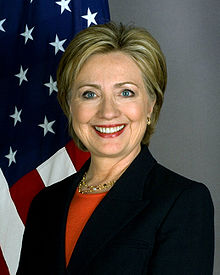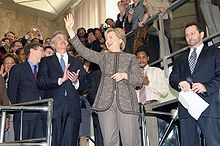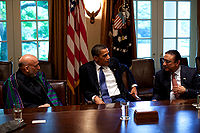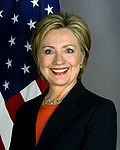- Foreign policy of the Barack Obama administration
-
The Foreign policy of the Barack Obama administration is the foreign policy of the United States from January 20, 2009 onward under the administration of President Barack Obama. Some of Obama's major foreign policy advisors include Secretary of State Hillary Rodham Clinton, National Security Advisor Tom Donilon, and United Nations Ambassador Susan Rice. Obama's overall foreign policy philosophy has been postulated as "The Obama Doctrine" by Washington Post columnist E.J. Dionne as "a form of realism unafraid to deploy American power but mindful that its use must be tempered by practical limits and a dose of self-awareness."[1]
Contents
History
See also: Barack Obama foreign policy, Barack Obama presidential campaign, 2008, and Presidential transition of Barack ObamaBackground
During his campaign for the presidency, Barack Obama advocated a phased redeployment of troops out of Iraq within 16 months of being sworn in as president.[2] In order to accomplish this Obama stated that he would, based on the conditions on the ground, redeploy between one and two battalions a month.[3] Some of the forces would return to the U.S., while others would be redeployed as part of a focus on the broader region including Afghanistan and Pakistan to confront terrorism.[4] Obama gave his first major foreign policy speech of his campaign on April 23, 2007 to the Chicago Council on Global Affairs, in which he outlined his foreign policy objectives, stressing five key points:
- "bringing a responsible end to this war in Iraq and refocusing on the critical challenges in the broader region,"
- "by building the first truly 21st century military and showing wisdom in how we deploy it,"
- "by marshalling a global effort to meet a threat that rises above all others in urgency – securing, destroying, and stopping the spread of weapons of mass destruction,"
- "rebuild and construct the alliances and partnerships necessary to meet common challenges and confront common threats", and
- "while America can help others build more secure societies, we must never forget that only the citizens of these nations can sustain them."
During his campaign, Obama emphasized the importance of diplomacy and development as tools to aid the U.S. in building new and even stronger alliances, re-building broken relationships and repairing the United States image abroad.[citation needed] In addition, he stated that one of his foreign policy objectives was to combat global poverty, generate wealth and build educated and healthy communities as a means to combat extremism.[citation needed]
President-elect Obama nominated former rival, Senator Hillary Rodham Clinton to serve as his Secretary of State on December 1, 2008, and chose to keep Secretary of Defense Robert Gates as his Secretary of Defense. He would appoint General James L. Jones to serve as his National Security Advisor and nominate Governor of Arizona Janet Napolitano as Secretary of Homeland Security.
Clinton stated during her confirmation hearings that she believed that "the best way to advance America's interests in reducing global threats and seizing global opportunities is to design and implement global solutions." She stated, "We must use what has been called "smart power", the full range of tools at our disposal — diplomatic, economic, military, political, legal and cultural — picking the right tool or combination of tools for each situation. With smart power, diplomacy will be the vanguard of our foreign policy."[5]
During the last weeks before his inauguration, in addition to the several major conflicts in the world, fighting related to the Israeli–Palestinian conflict erupted anew, specifically in Gaza, between Israel and the Hamas-led government. The 2008–2009 Israel–Gaza conflict ended in an uneasy cease-fire on January 18, 2009, two days prior to Obama's inauguration.
Initial themes
Further information: Obama inaugurationIn his inaugural address, Obama, elaborating on his foreign policy, suggested that he hoped to begin the process of withdrawing from Iraq and continuing to focus on the conflict in Afghanistan. He also mentioned lessening the nuclear threat through "working tirelessly with old friends and former foes." He spoke about America's determination to combat terrorism by proclaiming that America's spirit is "stronger and cannot be broken — you cannot outlast us, and we will defeat you." To the Muslim world, Obama extended an invite to "a new way forward, based on mutual interest and mutual respect." He also said we would be willing to "extend a hand" to those "who cling to power through corruption and deceit" if they "are willing to unclench" their fists.[6]
Obama added that, "we reject as false the choice between our safety and our ideals. Our Founding Fathers, faced with perils that we can scarcely imagine, drafted a charter to assure the rule of law and the rights of man — a charter expanded by the blood of generations. Those ideals still light the world, and we will not give them up for expedience sake."[6] Vice President Joe Biden reaffirmed this while the first major foreign policy speech of the administration, on February 7, 2009, when he proclaimed that there "is no conflict between our security and our ideals. They are mutually reinforcing. The force of arms won our independence, and throughout our history, the force of arms has protected our freedom. That will not change. But the very moment we declared our independence, we laid before the world the values behind our revolution and the conviction that our policies must be informed by a "decent respect for the opinions of mankind."
On his first full-day as president, January 21, 2009, Obama called President Mahmoud Abbas of the Palestinian National Authority, Prime Minister Olmert of Israel, King Abdullah of Jordan and President Mubarak of Egypt.[7] At the same time, Obama called on Israel to open the borders of Gaza, detailing early plans on his administration's peace plans for the Israeli-Palestinian conflict.[8] Obama and Secretary of State Clinton named George Mitchell as Special Envoy for Middle East peace and Richard Holbrooke as special representative to Pakistan and Afghanistan on January 23, 2009.[9] The Mitchell appointment signalled that Clinton might stay away from the direct Secretary-level negotiating that her predecessor, Condoleezza Rice, had spent much effort on during the previous two years.[10]
Within less than a week in her new position, Secretary of State Clinton had already called almost 40 foreign leaders or foreign ministers.[11] She said the world was eager to see a new American foreign policy and that, "There is a great exhalation of breath going on around the world. We’ve got a lot of damage to repair."[11] She did indicate that not every past policy would be repudiated, and specifically said it was essential that the six-party talks over the North Korean nuclear weapons program continue.[12]
Clinton re-emphasized her views during her first speech to State Department employees when she said, "There are three legs to the stool of American foreign policy: defense, diplomacy, and development. And we are responsible for two of the three legs. And we will make clear, as we go forward, that diplomacy and development are essential tools in achieving the long-term objectives of the United States. And I will do all that I can, working with you, to make it abundantly clear that robust diplomacy and effective development are the best long-term tools for securing America's future."[13] Clinton also soon visited the United States Agency for International Development, where she met employees and said they would be getting extra funds and attention during the new administration.[12]
Obama visited the State Department two days after his inauguration, where he said he wanted to "make sure that everybody understands that the State Department is going to be absolutely critical to our success in the years to come."[14] He mingled with the career foreign service officers and spoke to one in the Indonesian language he learned growing up.[15] Clinton said the visit indicated that Obama was "through word and deed, sending a loud and clear signal that diplomacy is a top priority."[15]
On January 26, Obama gave his first formal interview as president to the Arabic-language television news channel Al Arabiya.[16][17] Obama said that, "My job to the Muslim world is to communicate that the Americans are not your enemy."[16] Obama mentioned that he had spent several years growing up in the world's most populous Muslim nation, Indonesia, and called for resumed negotiations between Israel and Palestinians.[16] Obama's gesture in reaching out to the Muslim world was unprecedented for a U.S. president.[17]
President Obama has already visited more countries during his first year in office than any other president. His trip to Denmark, that failed to convince the International Olympic Committee to award the 2016 Summer Olympic games to Chicago, made Denmark the sixteenth country Obama visited since becoming President on January 20, 2009.[18]
Appointments
Further information: Confirmations of Barack Obama's CabinetThe administration appointed, or allowed to remain in office, 2,465 ambassadors. Most were career diplomats. 805 were political appointees. 110 of 150 ambassadorships were political in the Caribbean; 259 out of 358 appointees in Western Europe were political. Career diplomats dominated all other areas including: North and Central America, South America, Africa, Eastern Europe, Middle East, East Asia, South Asia and Oceania. In Central Asia, all appointees were career.[19]
Although he regards Obama's foreign policy stance as pragmatic and dovish, Robert Dreyfuss is concerned that several of Obama's top advisers have hawkish stances or connections. These include Tony Lake, United Nations ambassador-designate Susan Rice, Tom Daschle and Dennis Ross, along with leading Democratic hawks like Richard Holbrooke, close to vice president-elect Joe Biden or secretary of state-designate Hillary Clinton[20] Dreyfuss claims that Dennis Ross is the "inside man for the neoconservatives" in the Obama administration.[21]
Africa
While Africa is a continent the countries of Algeria, Egypt, Morocco, Tunisia, Libya, and Western Sahara are not considered to be part of sub-Sahara Africa and therefore are not associated with Africa for the foreign policy purposes of the United States but are instead considered to be part of the Near East (commonly referred to as the Middle East) when talking about United States foreign policy. Depending on the source these countries may or may not be included when talking about African foreign policy.
During the 2008 campaign Obama outlined his priorities for developing an Africa policy including taking action to stop "what U.S. officials have termed genocide in Darfur, fighting poverty, and expanding prosperity."[22] Some analysts believed that Obama's appointment of Susan Rice who is a former assistant secretary of state for African affairs, as U.S. ambassador to the United Nations was a sign that his administration would prioritize the continent.[22]
Then Secretary of State-designate Hillary Clinton, in a January 13 hearing of the Senate Foreign Relations Committee, described the "foreign policy objectives of the Obama administration in Africa" as being "rooted in security, political, economic and humanitarian interests."[23] She went on to say that the administration priorities would include "combating al-Qaida's efforts to seek safe havens in failed states in the Horn of Africa; helping African nations to conserve their natural resources and reap fair benefits from them; stopping war in Congo; [and] ending autocracy in Zimbabwe and human devastation in Darfur."[23]
Darfur, Eastern Congo, Ghana and Zimbabwe have all played a significant role in the United States Africa policy. Some foreign policy analysts believed that conflicts in "Sudan, Somalia, and eastern Congo" would "eclipse any other policy plans."[22]
President Obama visited Cairo, Egypt, where he addressed the "Muslim world" on June 4[24] and followed this trip with his first visit to sub-Saharan Africa, as President, on July 11, 2009 where he addressed Ghana's Parliament.[25]
He was followed by Secretary of State Hillary Clinton who took a seven nation trip to Africa in August including stops in Angola, Cape Verde, Democratic Republic of the Congo, Kenya, Liberia, Nigeria and South Africa. Some foreign policy analysts have made the claim that this is "the earliest in any U.S. administration that both the president and the secretary of state have visited Africa."[26]
Somalia
Further information: Somalia – United States relationsSee also: Piracy in SomaliaOne of the first actions of the Obama administration was to sign a memorandum of understanding with Kenya that would allow pirates captured off of Kenya's coast to be tried in Kenyan courts.[27][28]
A group of 4 armed Somali pirates took Richard Phillips, a captain of an American cargo ship, hostage on April 8, 2009 during a failed attempt to take over the Maersk Alabama.[29] President Obama ordered the U.S. military to conduct a rescue mission to free Phillips who was held hostage by the pirates for five days. He was rescued on April 12, 2009 by United States Navy SEALs who killed three pirates and obtained the surrender of a fourth, Abdul Wali Muse.[30][31][32][33][34]
The Obama administration's reaction and response to the kidnapping of Phillips has been commended as well as criticized, while others downplay his role in the rescue of Richard Phillips.[35][36][37]
Secretary of State Hillary Clinton met with the Somali President, Sheikh Sharif Sheikh Ahmed, on August 6 during her African trip.[38]
The New York Times reports in a September 17, 2009 article that "Much of the world is counting on Sheik Sharif to tackle piracy and beat back the spread of militant Islam, two Somali problems that have flared into major geopolitical ones" and that "Just this week, American commandos killed a Qaeda agent in southern Somalia in a daylight helicopter raid." This occurs at the same time as a drought which has caused many Somalis to face starvation.
Opposition forces include al-Shabab which controls the Somalia capital of Magadishu with the exception of a few blocks within the center of Mogadishu which is controlled by the Transitional Government of Sheikh Sharif Sheikh Ahmed.
There are also reports that the United States may increase its arms shipment to Somalia from 40 tones to 80 tons.[citation needed] While other reports indicate that some of these weapons may have fallen into the hands of al-Shabab.
There have also been claims by Sheikh Sharif Sheikh Ahmed and Secretary of State Hillary Clinton that neighboring Eritrea may be providing support and arms to al Shabab during her August trip to Kenya where they held a meeting and joint press conference. Eritrea has denied these claims.
Zimbabwe
Further information: Zimbabwe–United States relationsObama is a strong critic of the government of Zimbabwe led by President Robert Mugabe. Although Obama congratulated longtime opposition leader Morgan Tsvangirai on becoming Prime Minister of Zimbabwe under a power-sharing agreement, U.S. State Department spokesman Robert Wood warned, "We need to see evidence of good governance and particularly real, true power sharing on the part of Robert Mugabe before we are going to make any kind of commitment" to lifting economic sanctions on the impoverished Southern African country, which has been ruled by Mugabe since independence in 1980.[39]
After the death of Susan Tsvangirai, the prime minister's wife, in an automobile collision in central Zimbabwe on March 6, 2009, the U.S. State Department expressed condolences to Tsvangirai, who also received minor injuries in the wreck.[40]
Asia
East Asia
Further information: East Asian Foreign Policy of the Barack Obama administration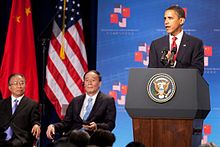 President Barack Obama addresses the opening session of the first U.S.–China Strategic and Economic Dialogue. Listening at left are Chinese Vice Premier Wang Qishan, center, and Chinese State Councilor Dai Bingguo, left.
President Barack Obama addresses the opening session of the first U.S.–China Strategic and Economic Dialogue. Listening at left are Chinese Vice Premier Wang Qishan, center, and Chinese State Councilor Dai Bingguo, left.
For purposes of U.S. foreign policy, East Asia consists of Burma (Myanmar), China, Hong Kong, Japan, Mongolia, South Korea, North Korea, Taiwan and Thailand. Secretary of State Hillary Clinton left on her first foreign policy tour (to Asia) on February 15, 2009 including scheduled stops in Japan, China, South Korea, Philippines, and Indonesia.[41]
In a speech given February 13, 2009, Clinton said that "some believe that China on the rise is, by definition, an adversary", but "[t]o the contrary, we believe that the United States and China can benefit from and contribute to each other's successes. It is in our interests to work harder to build on areas of common concern and shared opportunities."[41] Later that month, while on her inaugural East Asian tour, Clinton remarked, "We see the Chinese economic relationship as essential to our own country, so we're going to consult and work in a way that will be mutually beneficial."[42] Shortly thereafter, on April 1, 2009, Obama and Hu Jintao announced the establishment of the high-level U.S.-China Strategic and Economic Dialogue co-chaired by Hillary Clinton and Timothy Geithner on the U.S. side and Dai Bingguo and Wang Qishan on the Chinese side and on May 16, 2009 Obama personally announced the nomination of Jon Huntsman, Jr., the Republican Governor of Utah to fill the position of Ambassador to China. Huntsman was the only ambassador in the Administration to be personally announced by the President[43] and both he and President Barack Obama believed that the United States' relationship with China was the most important in the world.[44][dead link] Later that year, President Obama and Secretary Clinton made a high-profile trip to China on November 15–18, 2009 marking Obama's first visit to China. It was Obama's first presidential Asia trip since he was inducted. He also went to Japan, Singapore for the APEC summit and South Korea for the first U.S.-ASEAN summit. The United States Pacific Command have also been at the forefront of efforts to strengthen military relationships in the region.[45]
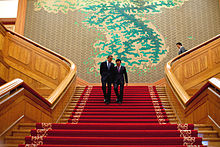 United States President Barack Obama and Lee walking after a meeting at the Blue House in Seoul in November 2010.
United States President Barack Obama and Lee walking after a meeting at the Blue House in Seoul in November 2010.
North Korea is another major area of engagement[46] for the foreign policy of the Obama Administration in the East Asian region. Not long after Obama took office as President of the United States on January 20, 2009, North Korea elbowed its way back onto the international stage after a period of relative quiet during the waning months of the Bush administration,[47] drawing accusations of planning a new long-range intercontinental ballistic missile test weeks after Obama was sworn in[48][49] and performing an unannounced nuclear warhead and missile testing in late May 2009 to the disapproval of Obama's State Department[50] Relations were further strained with the imprisonment of American journalists Euna Lee and Laura Ling for their alleged illegal entry into North Korean territory on assignment for a media organization.[51] although both women were later released on August 5, 2009.[52] Later that year, Pyongyang announced its intention to terminate the 1953 armistice ending hostilities in the Korean War on May 28, 2009 effectively restarting the nearly 60-year-old conflict, and prompting the South Korea-United States Combined Forces Command to Watchcon II, the second-highest alert level possible.[53] In 2010, two more major incidents with North Korea would occur under the Obama Administration: the sinking of a South Korean Navy Ship that actuated new rounds of military exercises with South Korea as a direct military response to sinking[54] and the Bombardment of Yeonpyeong prompting the US aircraft carrier USS George Washington to depart for joint exercises in the Yellow Sea with the Republic of Korea Navy, to deter further North Korean military action.[55][56] In light of the geopolitical developments with North Korea, the Obama Administration has called the U.S.-South Korean alliance as a "cornerstone of US security in the Pacific Region."[53]
Finally, Japan is a major area of engagement for the East Asian foreign policy of the Obama Administration. In her inaugural tour of East Asia, Secretary of State Hillary Clinton reassured Japanese officials of Japan's centrality in the network of American alliances.[42] In response to the 2011 Tōhoku earthquake and tsunami, the United States initiated Operation Tomodachi to support Japan in disaster relief following the 2011 Tōhoku earthquake and tsunami[57] earning gratitude from Japan's minister of defense, Toshimi Kitazawa who, while visiting the Ronald Reagan, thanked its crew for its assistance as part of Operation Tomodachi saying, "I have never been more encouraged by and proud of the fact that the United States is our ally."[58]
South Asia
Further information: South Asian Foreign Policy of the Barack Obama administrationFor purposes of U.S. foreign policy, South Asia consists of Afghanistan, Bangladesh, Bhutan, India, the Maldives, Nepal, Pakistan, and Sri Lanka. The Obama administrations's South Asian foreign policy was outlined in "The Obama Administration's Policy on South Asia" by Robert O. Blake, Jr., Assistant Secretary of State for the Bureau of South and Central Asian Affairs, who wrote "[o]ur goal was and remains to support the development of sovereign, stable, democratic nations, integrated into the world economy and cooperating with one another, the United States, and our partners to advance regional security and stability."[59]
At the start of the Obama administration there were several regional hot spots within South Asia including Afghanistan, India and Pakistan. Several conflicts exist within the region including an ongoing war in Afghanistan and an ongoing conflict in North-West Pakistan.
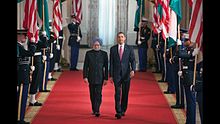 President Obama with Indian Prime Minister Manmohan Singh during the first state dinner hosted by the Obama administration.
President Obama with Indian Prime Minister Manmohan Singh during the first state dinner hosted by the Obama administration.
Blake described Obama's views of the "international effort in Afghanistan and Pakistan as a single theater of immense strategic importance to security - not only of the United States - but of the world." He goes on to say "Afghanistan and Pakistan are two distinct countries, but we cannot succeed in either Afghanistan or Pakistan without stability in both."[59] The Obama administration believes that "Afghanistan and Pakistan can be a bridge that links South and Central Asia, rather than a barrier that divides them" and that "much work remains to be done to turn that vision into a reality.[59] On February 18, 2009, Obama announced that the U.S. military presence in Afghanistan would be bolstered by 17,000 new troops by the summer.[60] Obama also ordered the expansion of airstrikes to include the organization of Baitullah Mehsud, the militant chief reportedly behind the 2007 assassination of Benazir Bhutto,[61] as priority targets.[62] Some foreign policy analysts consider this to be a continuation and/or an expansion of the Bush administration's foreign policy in Pakistan.[62]
There is also tension between India and Pakistan who both possess nuclear weapons.[63][64] This conflict has been ongoing since August 1947 when India and Pakistan were created from British India.[65] Recent developments in this conflict involve the Kashmir region with Pakistan controlling the northwest portion, India controlling the central and southern portion and the People's Republic of China controlling the northeastern portion of Kashmir. Criticism has been leveled at the Obama administration for its apparent lack of an early response to U.S. foreign policy with India. The former director for South Asia in the National Security Council in the Bush administration, Xenia Dormandy claims that India is America's indispensable ally in the region and that the Obama administration should take steps to improve relations with India.[66][67][68][69][70]
Europe
Main article: European foreign policy of the Barack Obama administrationMiddle East
Main articles: Middle East and Peace process in the Israeli–Palestinian conflictFurther information: Middle Eastern foreign policy of the Barack Obama administrationFor purposes of U.S. foreign policy, the Middle East consists of Iran, Iraq, Israel, Syria, and Libya.
After his inauguration the Obama administration was confronted with addressing on-going conflicts in Iraq, Israel-Gaza, Afghanistan and Pakistan. Other foreign policy issues related to the Middle East included combating terrorism, and promoting development and democracy. Obama appointed several Special Envoys including a Special Envoy for Middle East peace (George Mitchell) and a Special Envoy to Afghanistan and Pakistan (Richard C. Holbrooke).
Following the example of the United States several other European nations appointed special envoys to Afghanistan and Pakistan including Germany who appointed Bernd Mützelburg and the United Kingdom who selected Sir Sherard Cowper-Coles as its special envoy to the two countries.[71][72]
President Obama changed the timeline of withdrawing troops from Iraq within 16 months of his taking office as outlined in the election to 19 months after taking office.
The US-Israeli relations came under serious strain under the Barack Obama administration, as Israel announced it was pushing ahead with building 1,600 new homes in a Jewish area in East Jerusalem in March 2010, as Vice-President Joe Biden was visiting. It was described as "one of the most serious rows between the two allies in recent decades".[73] Secretary of State Hillary Clinton said Israel's move was "deeply negative" for US-Israeli relations.[74] However Obama was the first United States president to supply Israel with modern bunker buster bombs.[75]
After initial skepticism of international involvement to prevent Libyan leader Muammar al-Gaddafi from using violence to suppress popular demonstrations in his country,[76] the Obama administration crucially backed United Nations Security Council Resolution 1973 to create a Libyan no-fly zone, with United States Ambassador to the United Nations Susan Rice successfully pushing to include language allowing the UN mandate free rein to launch air attacks on Libyan ground targets threatening civilians.[77]
In March 2011, Obama authorized the firing of 110 Tomahawk cruise missiles against targets in Libya, in response to regime actions against rebel forces, to enforce the UN no-fly zone.[78] Controversy arose over whether Obama's use of military force without prior congressional approval was constitutional, with comments by Yale law professor Jack M. Balkin[79][not in citation given], Salon.com columnist Glenn Greenwald.[80] and current Legal Adviser of the Department of State Harold Hongju Koh.[81]
Americas
Brazil
Further information: Brazil–United States relationsOn November 7, 2008, three days after the election of Barack Obama, Al Jazeera English ran a feature story on the excitement and inspiration the election of the United States' first African American president was generating in Salvador da Bahia, Brazil, which has never elected a black president despite having a sizable black and mulatto population. "For the black community here, it represents advancement for us as well - and makes us think seriously of the possibility in Brazil of having a black president", the article quoted an Afro-Brazilian woman as saying.[82]
After the American Recovery and Reinvestment Act of 2009, which contained a "Buy American" clause, was made U.S. law with strong backing from Obama, Brazilian Foreign Minister Celso Amorim warned that his country could mount a legal challenge to U.S. economic protectionism, which has become an issue due to the late 2000s recession and which Brazil ardently opposes, at the World Trade Organization.[83]
President of Brazil Luiz Inácio Lula da Silva was the first Latin American leader to meet with Obama, participating in a joint press conference in the Oval Office and discussing energy policy with the American chief executive.[84]
Canada
See also: Canada – United States relations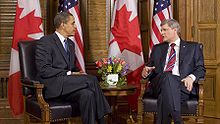 Canadian Prime Minister Stephen Harper (right) and US President Barack Obama (left) meet in Ottawa in February 2009
Canadian Prime Minister Stephen Harper (right) and US President Barack Obama (left) meet in Ottawa in February 2009
After Obama's presidential election victory in 2008, Prime Minister Harper called and congratulated Obama on his victory over John McCain, and he assured the President-elect that the two countries would remain the closest of allies. After he was inaugurated on January 20, 2009, as President of the United States, it was announced that Mr. Obama's first international trip would be to Canada, which took place on February 19, 2009.[85]
Aside from Canadian lobbying against "Buy American" provisions in the US stimulus package, relations between the two administrations had been smooth up to 2011. On February 4, 2011, Harper and Obama issued a "Declaration on a Shared Vision for Perimeter Security and Economic Competitiveness".[86][87]
Cuba
See also: United States embargo against CubaFurther information: Cuba–United States relationsDuring his presidential campaign in 2008, Obama asserted that his policy toward Cuba would be based on "libertad", promising that as President of the United States, he would push the Cuban government to embrace democratic reforms and free political prisoners.[88] After his election, former Cuban President Fidel Castro said he was "open" to the idea of meeting with the president-elect.[89] However most of his policies towards Cuba are unchanged from the Bush policies.[90]
After Obama announced the closure of the Guantánamo Bay detention camp shortly after his inauguration, Cuban President Raúl Castro said Havana would continue to push for the U.S. to "liquidate" the entire Guantanamo Bay Naval Base and return the land to Cuba.[91] He was joined by his vehement brother Fidel, who abandoned his magnanimity toward the new U.S. president and demanded that the base be retroceded to Cuba.[92]
While the United States House of Representatives passed legislation, backed by Obama, to ease certain travel and cash transactions imposed against Cuba by the U.S., on February 25, 2009, the president continues to oppose lifting the embargo against Cuba.[93] Obama professes to view the embargo as a useful tool for leverage on pushing for reform in Cuba.[94] This is in contrast to what Obama stated in 2004 when he said that it was time "to end the embargo with Cuba" because it had "utterly failed in the effort to overthrow Castro."[95] Obama's stance has met criticism from both Fidel Castro[96] and members of the U.S. government, including ranking member of the Senate Foreign Relations Committee Richard Lugar.[97] A panel with the Washington-based Brookings Institute released a report in late February 2009 urging Obama to normalize relations with Cuba.[98]
On June 2, leading a delegation to Honduras for the Organization of American States General Assembly, Clinton affirmed that Cuba needs to reach a certain political and democratic standard to rejoin the organization.[99]
Honduras
Further information: 2009 Honduran coup d'étatOn June 28, 2009, President Manuel Zelaya was arrested and exiled from the country. Obama condemned the action and described the event as a coup.[100] On July 7, Secretary of State Hillary Clinton met with Zelaya and agreed upon a U.S.-backed proposal for negotiations with the Micheletti government, mediated by President Óscar Arias of Costa Rica.[101] At the conclusion of the meeting, Clinton announced the suspension of economic and military aid to the Honduran government.[102] However, the U.S. led a group of Western Hempishere countries supporting the outcome of November 2009 presidential election of Porfirio Lobo as a way forward to resolve the situation.[103]
Jamaica
Further information: Jamaica-United States relationsThe United States of America pressured Prime Minister Bruce Golding to turn against a former ally, Christopher Coke.[104] Golding initially resisted pressure to arrest Coke, who was wanted in the United States on arms trafficking charges, and accused the United States of employing warrentless wiretapping to gather evidence against Coke. Golding ultimately gave in, however, and issued an arrest warrant for Coke.[105] The subsequent attempt to arrest Coke sparked the 2010 Kingston unrest.
Venezuela
Further information: United States–Venezuela relationsWhile Barack Obama set a conciliatory tone for his relations with Venezuela during his candidacy, saying he would be willing to meet with Venezuelan President Hugo Chávez without preconditions at a July 23, 2007, presidential debate,[106] the Venezuelan leader has been fickle in his opinion of Obama. Even during the election he varied from liking Obama to saying that nothing would change with the US.
On February 15, 2009, Chávez said, "Any day is propitious for talking with President Barack Obama,"[107] but said later that month that he "couldn't care less" about meeting the new U.S. president[108] ahead of an impending confrontation between the two leaders at the Summit of the Americas in Port-of-Spain, Trinidad, in mid-April.[109]
Chávez derided Obama as "a continuation of the Bush era" after a U.S. report on narcotics trafficking was released in late February 2009. "Don't mess with me, Mr. Obama", warned Chávez, who has been president of Venezuela since 1999.[110]
However as recently as the first week of March, Chávez called upon Obama to follow the path to socialism, which he termed as the "only" way out of the global recession. "Come with us, align yourself, come with us on the road to socialism. This is the only path. Imagine a socialist revolution in the United States", Chávez told a group of workers in the southern Venezuelan state of Bolívar. He said that people were calling Obama a "socialist" for the measures of state intervention he is taking to counter the crisis, so it would not be too far-fetched to suggest that he might join the project of "21st century socialism" that the Venezuelan leader is heading.[111]
Later in March he referred to Obama as a "poor ignoramus" for not knowing the situation in Latin America and even implied that Brazil's President Lula was not completely happy with his meeting with Obama. However the Brazilian Foreign Ministry denied that this was the case.[112]
In Tokyo in early April, where he attended meetings to discuss trade deals with the Japanese, Chávez said he was not biased against the Obama administration and he fully supported the idea of a 21st century free from conflict.[113]
In Trinidad on April 17, 2009, Obama and Chávez met for the first time, with the former asking in Spanish, "Come Estas?" Later, Chávez walked over to Obama during the summit, and handed him a copy of The Open Veins of Latin America: Five Centuries of the Pillage of a Continent by Uruguayan author Eduardo Galeano, an essay about U.S. and European economic and political interference in the region. During the summit, Obama is reported to have said, to much applause, "We have at times been disengaged, and at times we sought to dictate our terms, but I pledge to you that we seek an equal partnership. There is no senior partner and junior partner in our relations."
Other issues
Climate change
On January 27, 2009, Secretary of State Clinton appointed Todd Stern as the department's Special Envoy for Climate Change.[114] Clinton said that, "With the appointment today of a special envoy we are sending an unequivocal message that the United States will be energetic, focused, strategic and serious about addressing global climate change and the corollary issue of clean energy."[115] Stern, who had coordinated global warming policy in the late 1990s under the Bill Clinton administration, said that "The time for denial, delay and dispute is over.... We can only meet the climate challenge with a response that is genuinely global. We will need to engage in vigorous, dramatic diplomacy."[115]
In February 2009, Stern said that the U.S. would take a lead role in the formulation of a new climate change treaty in Copenhagen in December 2009. He made no indication that the U.S. would ratify the Kyoto Protocol in the meantime.[116] US Embassy dispatches subsequently released by whistleblowing site WikiLeaks showed how the US 'used spying, threats and promises of aid' to gain support for the Copenhagen Accord, under which its emissions pledge is the lowest by any leading nation.[117][118]
Increased Exports
Obama's "national export initiative" intends to double U.S. exports over the next five years. Because traditional manufacturing industries and services offer little room for growth this will require the United States to increase its 68% share of the global arms market.[119] This has included expanding the size and scope of arms deals that Bush had left uncompleted such as advanced aircraft for Saudi Arabia and Taiwan.[120][121][122] In FY 2009 this resulted in an increase in $700 million in Foreign Military Sales.[123] The State Department has announced a change from the formal Foreign Military Sales to a more commercial basis for the export of military equipment to Taiwan and Obama is expected to sign an executive order to streamline the review of arms exports.[124][125]
The reform of export control laws is an area of focus for the President's Export Council.[clarification needed][126][127][128] Baker Spring of the Heritage Foundation has called the new export policy "ambitious" and urged the ratification of treaties that would grant blanket exemptions on export controls to selected allies.[129]
The loosing of export rules on items such as tanks and other military vehicles is expected to be complete before the end of 2012.[130]
Muslim Relations
See also: A New BeginningPresident Obama's first trip to a Muslim majority country occurred on April 6–7, 2009 when he visited Turkey and spoke to the Grand National Assembly.[131]
President Obama addressed the Muslim world in a speech in Cairo, Egypt on June 4, 2009.[24] In that speech President Obama issued a call for "a new beginning" in the relationship between the United States and Muslims around the world. He outlined his ideas about "engaging the Muslim world" and how to create "a new beginning."
“ "There is no one bullet that's going to fix everything, there is not one program that's going to be the magic program to engage with Muslims." ” —Farah Pandith[132]
Farah Pandith was appointed as the State Department's "first ever Special Representative to Muslim Communities" and was sworn in on September 15, 2009.[133]
She describes her responsibilities as including actively listening and responding to "the concerns of Muslims in Europe, Africa, and Asia."[133]
On February 13, 2010, President Obama appointed Rashad Hussain, an Indian-American Muslim,[134] as the United States special envoy to the Organisation of the Islamic Conference.[135] After the appointment, President Obama stated, "Rashad has played a key role in developing the partnerships I called for in Cairo. And as a Hafiz of the Qur'an, he is a respected member of the American Muslim community, and I thank him for carrying forward this important work."[134][136]
See also
- Hillary Rodham Clinton's tenure as Secretary of State
- List of presidential trips made by Barack Obama
References
- ^ E.J. Dionne Jr., "The Obama Doctrine", 16 April 2009, Available online. , Archived by WebCite.
- ^ Kessler, Glenn (2008-11-08). "Obama to Face Big Policy Decisions on Iran, N. Korea and Mideast". The Washington Post. http://www.washingtonpost.com/wp-dyn/content/article/2008/11/07/AR2008110703522.html. Retrieved 2008-11-08.
- ^ "Biden fumbles military terms", The Hill, August 28, 2008. Retrieved 2009-2-06
- ^ Pleitgen, Fred."Soldiers pulled from Iraq duty, sent straight to Afghanistan", CNN. April 24, 2009. Retrieved 2009-2-06
- ^ Clinton, Hillary (2009-01-13). "Nomination Hearing To Be Secretary of State". State Department. http://www.state.gov/secretary/rm/2009a/01/115196.htm. Retrieved 2009-01-13.
- ^ a b Whitehouse.gov (2009-01-20). "Obama's inaugural address full text and video". White House. http://www.whitehouse.gov/blog/inaugural-address/. Retrieved 2009-01-26.
- ^ Baldwin, Tom (January 22, 2009). "President Obama's first call 'was to President Abbas'". The Times (London). http://www.timesonline.co.uk/tol/news/world/us_and_americas/us_elections/article5563280.ece. Retrieved 2009-01-23.
- ^ "Obama urges Israel to open Gaza borders". http://www.ft.com/cms/s/0/7cf745dc-e8ce-11dd-a4d0-0000779fd2ac.html. Retrieved 2009-01-22.
- ^ "President Obama Delivers Remarks to State Department Employees". The Washington Post. January 22, 2009. http://www.washingtonpost.com/wp-dyn/content/article/2009/01/22/AR2009012202550.html. Retrieved 2009-01-23.
- ^ Smith, Ben (2009-01-22). "U.S. foreign policy: Who's in charge?". The Politico. http://www.politico.com/news/stories/0109/17811.html. Retrieved 2009-02-08.
- ^ a b Landler, Mark (2009-01-27). "Clinton Sees an Opportunity for Iran to Return to Diplomacy". The New York Times. http://www.nytimes.com/2009/01/28/washington/28diplo.html. Retrieved 2009-01-28.
- ^ a b "Hillary Clinton leaves quick stamp on US State Department". Agence France-Presse. 2009-01-27. http://www.google.com/hostednews/afp/article/ALeqM5h8Nz42mnD4KInXaR7sSafwvKDAsA. Retrieved 2009-02-08.
- ^ Clinton, Hillary (2009-01-22). "Arrival at the Department of State". State Department. http://www.state.gov/secretary/rm/2009a/01/115262.htm. Retrieved 2009-02-08.
- ^ "President Obama Delivers Remarks to State Department Employees". The Washington Post. CQ Transcriptions. 2009-01-22. http://www.washingtonpost.com/wp-dyn/content/article/2009/01/22/AR2009012202550.html. Retrieved 2009-02-08.
- ^ a b Dilanian, Ken (2009-01-22). "Key appointments mark Clinton's first day at State Dept.". USA Today. http://www.usatoday.com/news/washington/2009-01-22-state-dept_N.htm. Retrieved 2009-02-08.
- ^ a b c "Obama tells Al Arabiya peace talks should resume". Al Arabiya. 2009-01-27. http://www.alarabiya.net/articles/2009/01/27/65087.html. Retrieved 2009-02-08.
- ^ a b MacLeod, Scott (2009-01-28). "How Al-Arabiya Got the Obama Interview". Time. http://www.time.com/time/world/article/0,8599,1874379,00.html.
- ^ Thomma, Steven (2009-01-13). "Obama's No. 1 -- most foreign travel by first year president". McClatchy Newspapers. http://www.mcclatchydc.com/226/story/76725.html. Retrieved 2009-10-07.
- ^ Al Kamen (2009-10-23). "In the Loop:Donors and cronies still get the choice postings". Washington Post: pp. 24A. http://www.washingtonpost.com/wp-dyn/content/article/2009/10/22/AR2009102204547.html.
- ^ http://www.atimes.com/atimes/Middle_East/JL04Ak01.html
- ^ http://www.thenation.com/blog/37220/hawks-uae-ambassador-want-war-iran
- ^ a b c "Imagining Obama's Africa Policy". Council on Foreign Relations. December 22, 2008. http://www.cfr.org/publication/18006/imagining_obamas_africa_policy.html.
- ^ a b "Hillary Clinton Outlines Obama's Africa Policy". allAfrica.com. January 24, 2009. http://allafrica.com/stories/200901240009.html.
- ^ a b "Text: Obama's Speech in Cairo". The New York Times. New York Times. June 4, 2009. http://www.nytimes.com/2009/06/04/us/politics/04obama.text.html. Retrieved May 2, 2010.
- ^ "Obama Ghana Speech: FULL TEXT". Huffington Post. July 11, 2009. http://www.huffingtonpost.com/2009/07/11/obama-ghana-speech-full-t_n_230009.html.
- ^ "A New Beginning: U.S. Policy in Africa". http://globalhealth.kff.org/Events/2009/September/15/091509-CAP-US-Africa-Policy.aspx.
- ^ "Kenya, US Agree to Deal on Piracy". VOA News. January 27, 2009. http://www.voanews.com/english/archive/2009-01/2009-01-27-voa16.cfm?CFID=293384034&CFTOKEN=30975558&jsessionid=de304116e062b53f031c12424331491a3f47.
- ^ "Kenya Accepts Seven Alleged Pirates from U.S. Navy for Trial". March 5, 2009. http://www.america.gov/st/peacesec-english/2009/March/20090305170025sjhtrop0.3772089.html. Retrieved September 16, 2009.
- ^ Sanders, Edmund; Barnes, Julian E. (April 9, 2009). "Somalia pirates hold U.S. captain". Los Angeles Times. http://www.latimes.com/news/nationworld/world/la-fg-somali-pirates9-2009apr09,0,4104857.story. Retrieved September 16, 2009.
- ^ "Official: US sea captain faced imminent danger". Associated Press. April 12, 2009. http://www.google.com/hostednews/ap/article/ALeqM5gSXyAok3YrJTZLKD31SAjC9pfvkgD97H4J581. Retrieved September 16, 2009.
- ^ Mikkelsen, Randall (April 12, 2009). "US acted after pirates aimed at ship captain". Reuters. Archived from the original on April 14, 2009. http://www.webcitation.org/5g1mfPfQu. Retrieved September 16, 2009.
- ^ "US captain rescued from pirates". BBC News. April 13, 2009. http://news.bbc.co.uk/2/hi/africa/7996087.stm. Retrieved September 16, 2009.
- ^ Verjee, Zain; Starr, Barbara (April 12, 2009). "Captain jumps overboard, SEALs shoot pirates, official says". CNN. http://www.cnn.com/2009/WORLD/africa/04/12/somalia.pirates/index.html. Retrieved September 16, 2009.
- ^ "US captain held by pirates freed". BBC News. April 12, 2009. http://news.bbc.co.uk/2/hi/africa/7996087.stm. Retrieved September 16, 2009.
- ^ "Blood in the Water". Newsweek. April 15, 2009. http://www.newsweek.com/id/194167.
- ^ "President Obama Ordered the Killing of Three Black Muslim Kids". The Rush Limbaugh Show. April 14, 2009. http://www.rushlimbaugh.com/home/daily/site_041409/content/01125110.guest.html.
- ^ "Why Obama's Action Against the Somali Pirates Matters". U.S. News. April 23, 2009. http://www.usnews.com/articles/news/obama/2009/04/23/why-obamas-action-against-the-somali-pirates-matters.html.
- ^ "Clinton threatens Eritrea action". BBC News. BBC. August 6, 2009. http://news.bbc.co.uk/2/hi/africa/8186781.stm.
- ^ "Obama congratulates Tsvangirai". NewsToday.co.za. February 13, 2009. http://www.newstoday.co.za/cgi-bin/newstoday/show.pl?1234511214.
- ^ "MDC to examine Tsvangirai crash". BBC News. March 7, 2009. http://news.bbc.co.uk/2/hi/africa/7930126.stm.
- ^ a b Kessler, Glenn (2009-02-15). "China Is at the Heart of Clinton's First Trip". The Washington Post. http://www.washingtonpost.com/wp-dyn/content/article/2009/02/14/AR2009021401382.html. Retrieved 2009-02-16.
- ^ a b Alford, Peter (2009-02-16). "Clinton reaffirms Japanese alliance". The Australian. http://www.theaustralian.news.com.au/story/0,25197,25065503-2703,00.html. Retrieved 2009-02-16.
- ^ Superville, Darlene (May 16, 2009). "Utah GOP governor is Obama's pick as China envoy". Associated Press. http://hosted.ap.org/dynamic/stories/U/US_OBAMA_UTAH_GOVERNOR?SITE=CONGRA&SECTION=HOME&TEMPLATE=DEFAULT.
- ^ http://www.google.com/hostednews/ap/article/ALeqM5j-yQlR5_JNe78YN3dDP6z6ZGP_hgD988SSQ00
- ^ Sun to Set on US Role in APAC?
- ^ "President Obama: North Korea a serious threat". BBCNews. November 24, 2010. http://www.bbc.co.uk/news/world-asia-pacific-11825445.
- ^ Feffer, John (February 17, 2009). "North Korea to Obama: Don’t Ignore Us!". The Progressive. http://www.progressive.org/mag/mfeffer021909.html.
- ^ Soloman, Jay; Siobhan Gorman (February 3, 2009). "U.S. Believes North Korea May Be Preparing Long-Range Missile Test". The Wall Street Journal. http://online.wsj.com/article/SB123369457060044717.html?mod=googlenews_wsj.
- ^ Parry, Richard Lloyd (February 3, 2009). "North Korea 'prepares to test long-range missile'". The Times. Times Online (London). http://www.timesonline.co.uk/tol/news/world/asia/article5647653.ece.
- ^ "US-Seoul alert raised over N Korea". Al Jazeera English. May 28, 2009. http://english.aljazeera.net/news/asia-pacific/2009/05/200952842228594660.html.
- ^ Koo, Heejin (2009-08-02), "U.S. Journalists Say Soldiers Dragged Them Back to North Korea", Bloomberg News, http://www.bloomberg.com/apps/news?pid=20601087&sid=atVK6Ln3Mb.w, retrieved 2009-08-02
- ^ "N. Korean leader reportedly pardons U.S. journalists". CNN. 2009-08-04. http://www.cnn.com/2009/WORLD/asiapcf/08/04/nkorea.clinton/index.html. Retrieved 2009-08-04.
- ^ a b "Alert level raised on North Korea". BBC News. May 28, 2009. http://news.bbc.co.uk/2/hi/asia-pacific/8071175.stm.
- ^ U.S., South Korea plan military exercises, by Julian E. Barnes and Paul Richter, LA Times, 25-05-2010
- ^ Dogyun, Kim; Steward, Phil (2010-11-24). "U.S. aircraft carrier heads for Korean waters". Reuters. http://www.reuters.com/article/idUSL3E6MN0SQ20101124. Retrieved 2010-11-27.
- ^ Sanger, David E.; McDonald, Mark (2010-11-23). "South Koreans and U.S. to Stage a Joint Exercise". New York Times. http://www.nytimes.com/2010/11/24/world/asia/24nkorea.html?_r=1&hp. Retrieved 2010-11-27.
- ^ Dilanian, Ken (March 12, 2011). "U.S. military, aid teams headed for Japan". Los Angeles Times. http://www.latimes.com/news/nationworld/world/sc-dc-japan-quake-us-relief-20110313,0,5697005.story.
- ^ Kyodo News, "Japanese defense chief thanks U.S. military for humanitarian efforts", 4 April 2011.
- ^ a b c State.gov (2009-09-09). "The Obama Administration's Policy on South Asia". State Department. http://www.state.gov/p/sca/rls/remarks/128753.htm. Retrieved 2009-09-09.[dead link]
- ^ Hodge, Amanda (February 19, 2009). "Obama launches Afghanistan surge". The Australian. http://www.theaustralian.news.com.au/story/0,25197,25074581-2703,00.html.
- ^ "Profile: Baitullah Mehsud". BBC News. December 28, 2007. http://news.bbc.co.uk/2/hi/south_asia/7163626.stm.
- ^ a b Mark Mazzetti, David E. Sanger (February 20, 2009). "Obama Expands Missile Strikes Inside Pakistan". The New York Times. http://www.nytimes.com/2009/02/21/washington/21policy.html?partner=rss&emc=rss.
- ^ India and weapons of mass destruction. In Wikipedia, the free encyclopedia. Retrieved September 16, 2009, from http://en.wikipedia.org/wiki/India_and_weapons_of_mass_destruction
- ^ Pakistan and weapons of mass destruction. In Wikipedia, the free encyclopedia. Retrieved September 16, 2009, from http://en.wikipedia.org/wiki/Pakistan_and_weapons_of_mass_destruction
- ^ Wars and conflicts between India and Pakistan. In Wikipedia, the free encyclopedia. Retrieved September 16, 2009, from http://en.wikipedia.org/wiki/Wars_and_conflicts_between_India_and_Pakistan
- ^ A U.S. Asia strategy for Hillary Clinton's trip
- ^ Mrs. Clinton Goes To China
- ^ Obama Should Visit India--Soon
- ^ Ignoring India
- ^ "India frets over Obama's Chinamania". Asia Times Online. http://www.atimes.com/atimes/South_Asia/KC14Df01.html.
- ^ "Berlin appoints special envoy to Afghanistan and Pakistan". The Local. 2009-02-16. http://www.thelocal.de/politics/20090216-17459.html. Retrieved 2009-02-16.
- ^ "Germany names Afghan-Pakistan envoy". 2009-02-16. http://www.upi.com/Top_News/2009/02/16/Germany_names_Afghan-Pakistan_envoy/UPI-55741234809442/. Retrieved 2009-02-16.
- ^ "US-Israel row: Israeli views". BBC News. March 24, 2010. http://news.bbc.co.uk/2/hi/middle_east/8585239.stm.
- ^ "Clinton rebukes Israel over homes". BBC News. March 12, 2010. http://news.bbc.co.uk/2/hi/middle_east/8565455.stm.
- ^ Shanker, Thom. "U.S. Quietly Supplies Israel With Bunker-Busting Bombs." New York Times, 24 September 2011.
- ^ "U.S. Ambassador to NATO: No-fly zone wouldn't help much". Foreign Policy. 7 March 2011. http://thecable.foreignpolicy.com/posts/2011/03/07/us_ambassador_to_nato_no_fly_zone_wouldn_t_help_much. Retrieved 18 March 2011.
- ^ "US plans for military action in Libya". The Australian. 18 March 2011. http://www.theaustralian.com.au/us-plans-for-military-action-in-libya/story-fn7ycml4-1226023827019. Retrieved 18 March 2011.
- ^ Gaddafi 'not targeted' by allied strikes. BBC News, March 21, 2011.
- ^ Balkin, Jack. Bradley Manning, Barack Obama and the National Surveillance State[not in citation given]. Personal blog of Yale law professor Jack Balkin, March 17, 2011.
- ^ Greenwald, Glenn. Obama on presidential war-making powers. Salon.com, March 18, 2011.
- ^ Harold Hongju Koh (2011-03-27). "Statement Regarding Use of Force in Libya". America.gov. http://www.america.gov/st/texttrans-english/2011/March/20110327160858su0.4296992.html?CP.rss=true.
- ^ Elizondo, Gabriel (November 7, 2008). "Obama inspires Afro-Brazilians". Al Jazeera English. http://english.aljazeera.net/news/americas/2008/11/200811619119961388.html.
- ^ Colitt, Raymond (February 16, 2009). "Brazil may challenge 'Buy American' at WTO". Reuters. http://www.foxbusiness.com/story/markets/industries/government/update--brazil-challenge-buy-american-wto/.
- ^ "Obama's Energy Partnership for the Americas". Latin Business Chronicle. March 23, 2009. http://www.latinbusinesschronicle.com/app/article.aspx?id=3249.
- ^ "Obama to visit Canada Feb. 19, PMO confirms - CTV News". Ctv.ca. 2009-01-28. http://www.ctv.ca/servlet/ArticleNews/story/CTVNews/20090128/canada_obama_090128/20090128?hub=Politics. Retrieved 2011-02-26.
- ^ "Joint Statement by President Obama and Prime Minister Harper of Canada on Regulatory Cooperation | The White House". Whitehouse.gov. 2011-02-04. http://www.whitehouse.gov/the-press-office/2011/02/04/joint-statement-president-obama-and-prime-minister-harper-canada-regul-0. Retrieved 2011-02-26.
- ^ "PM and U.S. President Obama announce shared vision for perimeter security and economic competitiveness between Canada and the United States - Prime Minister of Canada". Pm.gc.ca. 2011-02-04. http://www.pm.gc.ca/eng/media.asp?id=3931. Retrieved 2011-02-26.
- ^ "Obama: Cuba policy to be based on 'libertad'". CNN. May 23, 2008. http://www.cnn.com/2008/POLITICS/05/23/obama.cuban.americans/index.html.
- ^ Neill, Morgan (December 5, 2008). "Castro expresses willingness to meet with Obama". CNN. http://edition.cnn.com/2008/WORLD/americas/12/05/cuba.castro.obama/index.html.
- ^ Cuba Detains a U.S. Contractor
- ^ "Cuba to insist on Guantanamo base closure – Raul Castro". Itar-Tass. January 22, 2009. http://inthesenewtimes.com/2009/01/26/cuba-to-insist-on-guantanamo-base-closure-%E2%80%93-raul-castro/.
- ^ Frank, Marc (January 30, 2009). "Fidel Castro demands Obama return Guantanamo base". Reuters. http://www.alertnet.org/thenews/newsdesk/N29286719.htm.
- ^ Cornwell, Susan (February 25, 2009). "House votes to ease limits on Cuba trade, travel". Reuters. http://uk.reuters.com/article/usPoliticsNews/idUKTRE51O7AG20090225.
- ^ Borghese, Matthew (May 23, 2008). "Obama Promises To Maintain Cuban Embargo". All Headline News. http://www.allheadlinenews.com/articles/7011045005.
- ^ "Obama's Cuba, Latin America policy". Politico. May 23, 2008. http://www.politico.com/news/stories/0508/10591.html.
- ^ "Castro: Obama Embargo Plan Will Cause Cubans to Go Hungry". Associated Press. May 26, 2008. http://www.foxnews.com/politics/elections/2008/05/26/castro-obama-embargo-plan-will-cause-cubans-to-go-hungry/.[dead link]
- ^ "Key GOP senator calls Cuba embargo ineffective". CNN. February 23, 2009. http://www.cnn.com/2009/POLITICS/02/23/cuba.lugar/index.html.
- ^ Brice, Arthur (February 27, 2009). "Panel urges Obama to normalize ties with Cuba". CNN. http://edition.cnn.com/2009/POLITICS/02/27/us.cuba.relations/index.html.
- ^ http://www.msnbc.msn.com/id/31055936/
- ^ http://www.google.com/hostednews/ap/article/ALeqM5jAkMGKIUDg_ngUiZboxQbYj5_DPwD994JGC80
- ^ "Honduras' Zelaya says to meet coup backers on Thursday". Reuters. July 7, 2009. http://www.reuters.com/article/topNews/idUSTRE56424C20090707?pageNumber=1&virtualBrandChannel=0.
- ^ http://www.state.gov/r/pa/prs/ps/2009/july/125762.htm
- ^ "Honduran President-Elect Banking on US Support". http://abcnews.go.com/International/wireStory?id=9203250.
- ^ Tandon, Shaun (28 May 2010). "Jamaica slum seethes as kingpin eludes assault". The Sydney Morning Herald. http://news.smh.com.au/breaking-news-world/jamaica-slum-seethes-as-kingpin-eludes-assault-20100528-wi3n.html. Retrieved 27 May 2010.
- ^ Fahim, Kareem (27 May 2010). "Death Toll in Jamaica Rises to 73". The New York Times. http://www.nytimes.com/2010/05/28/world/americas/28jamaica.html. Retrieved 27 May 2010.
- ^ Obama / Clinton on meeting anti-US leaders. February 7, 2008. http://www.youtube.com/watch?v=e3Oj7Jn9rv4.
- ^ "Venezuela President Chavez Ready to Talk to US President Obama". Novinite. February 15, 2009. http://www.novinite.com/view_news.php?id=101268.
- ^ "'Couldn't care less' about meeting Obama: Chavez". AFP. February 27, 2009. http://rawstory.com/news/afp/_Couldn_t_care_less_about_meeting_O_02272009.html.
- ^ Ramjeet, Oscar (February 2, 2009). "Obama and Chavez to meet in Trinidad in April". Caribbean Net News. http://www.caribbeannetnews.com/article.php?news_id=13952.
- ^ "Chavez says Obama same as Bush on drug war". AFP. February 28, 2009. http://www.breitbart.com/article.php?id=CNG.2b0b8bd405048e19f36fa896834ca058.eb1&show_article=1.
- ^ http://www.poligazette.com/2009/03/07/hugo-chavez-calls-on-obama-to-continue-doing-whats-hes-doing/
- ^ http://www.reuters.com/article/topNews/idUSTRE52L19G20090322?feedType=RSS&feedName=topNews&rpc=22&sp=true/Venezuela's Chavez calls Obama "ignoramus"
- ^ http://www.reuters.com/article/worldNews/idUSTRE53611320090407/Chavez says not biased against Obama administration
- ^ Secretary Clinton Announces Appointment of Special Envoy for Climate Change Todd Stern
- ^ a b Whitesides, John (2009-01-26). "Clinton climate change envoy vows 'dramatic diplomacy'". Reuters. http://www.reuters.com/article/vcCandidateFeed1/idUSN26361321. Retrieved 2009-01-28.
- ^ Rosenthal, Elisabeth (February 28, 2009). "Obama's Backing Raises Hopes for Climate Pact". The New York Times. http://www.nytimes.com/2009/03/01/science/earth/01treaty.html?_r=2&ref=politics.
- ^ Carrington, Damian (December 3, 2010). "WikiLeaks cables reveal how US manipulated climate accord". London: The Guardian. http://www.guardian.co.uk/environment/2010/dec/03/wikileaks-us-manipulated-climate-accord. Retrieved December 21, 2010.
- ^ "Who's On Board with the Copenhagen Accord". http://www.usclimatenetwork.org/policy/copenhagen-accord-commitments. Retrieved December 21, 2010.
- ^ White House Export Goals Require More Weapons Sales
- ^ U.S. to Sell F-15s to Saudis
- ^ The US worries about Taiwan's military transfer to China
- ^ Kimes, Mina. "America's hottest export: Weapons." Fortune Magazine, 11 February 2011.
- ^ Report reveals $11.7 billion in arms deliveries in 2009, but sheds little light on individual exports
- ^ ROC Central News Agency U.S. arms sales to return to normal track: Taiwan official
- ^ U.S. unveils new export laws for military-related equipment Christopher Hinton, MarketWatch
- ^ Boeing CEO McNerney Statement on U.S. Export Control Proposals - Aug 31, 2010
- ^ President's Export Council
- ^ Background on the President's Export Council Announcement Event Today
- ^ The Obama Administration's Ambitious Export Control Reform Plan
- ^ Svitak, Amy. "White House Proposes Export Control Changes." Aviation Week, 21 July 2011.
- ^ "Obama reaches out to Muslim world". BBC News. BBC. April 6, 2009. http://news.bbc.co.uk/2/hi/europe/7984762.stm.
- ^ http://www.rferl.org/content/US_Appoints_First_Special_Representative_To_Muslim_Communities/1823817.html
- ^ a b "U.S. Confirms First Special Representative To Muslim Communities". Radio Free Europe. September 16, 2009. http://www.rferl.org/content/US_Appoints_First_Special_Representative_To_Muslim_Communities/1823817.html.
- ^ a b "Obama picks special envoy to world Muslim group". CNN. February 13, 2010. http://politicalticker.blogs.cnn.com/2010/02/13/obama-picks-special-envoy-to-world-muslim-group/?fbid=rlf3tzpVovi. Retrieved February 5, 2010.
- ^ "Obama Taps Envoy to Islamic Group to Improve Ties (Update2)". Business Week. February 13, 2010. http://www.businessweek.com/news/2010-02-13/obama-taps-envoy-to-islamic-group-to-improve-ties-update1-.html. Retrieved February 5, 2010.
- ^ "President Obama Addresses the U.S.-Islamic World Forum". The White House Blog. http://www.whitehouse.gov/blog/2010/02/13/president-obama-addresses-us-islamic-world-forum/. Retrieved February 14, 2010.
External links
- The Obama Moment: European and American Perspectives European Union Institute for Security Studies
- Travels of the Obama Presidency - slideshow by ABC News
- How the World Sees Barack Obama - slideshow by Life magazine
Barack Obama Life and politics - Early life and career
- Illinois Senate elections
- Illinois Senate career
- U.S. House election in Illinois, 2000
- 2004 Democratic National Convention
- U.S. Senate election in Illinois, 2004
- U.S. Senate career
- 2008 presidential primary campaign
- Obama–Biden 2008
- Electoral history
- Political positions (Economic, Social, Energy, Foreign/Administration foreign policy)
- Nobel Peace Prize
- 2012 presidential re-election campaign
- West Wing Week
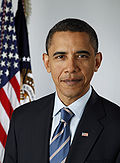
Presidency - Transition
- Inauguration
- Timeline: 2009, 2010, 2011
- Judiciary (Supreme Court candidates)
- Foreign policy (Obama Doctrine)
- First 100 days
- Health care reform
- Presidential trips (2009, 2010, 2011)
- People pardoned
- Death of Osama bin Laden
Books Speeches - "The Audacity of Hope" (2004)
- "A More Perfect Union" (2008)
- "Change Has Come to America" (2008)
- "A New Birth of Freedom" (2009)
- Joint session of Congress (February 2009)
- "A New Beginning" (2009)
- Joint session of Congress (health care reform) (September 2009)
- State of the Union (2010)
- Barack Obama Tucson memorial speech (2011)
- State of the Union (2011)
- Joint session of Congress (jobs) (2011)
Family - Michelle Obama (spouse)
- Stanley Ann Dunham (mother)
- Barack Obama, Sr. (father)
- Lolo Soetoro (stepfather)
- Maya Soetoro-Ng (half-sister)
- Stanley Armour Dunham (grandfather)
- Madelyn Payne Dunham (grandmother)
- Marian Shields Robinson (mother-in-law)
- Craig Robinson (brother-in-law)
- Bo (family dog)
Hillary Rodham Clinton Secretary of State Tenure as Secretary of State · Foreign policy of the Barack Obama administrationSenator,
Presidential candidateFirst Lady Arkansas Her books Senior thesis · Scholarly articles · It Takes a Village · An Invitation to the White House: At Home with History · Living HistoryReactions Family Public policy of the United States Agricultural · Arctic · Climate change (G.W. Bush) · Domestic (Reagan, G.W. Bush) · Drug · Economic (G.W. Bush, Obama) · Energy (Obama) ·
Environmental · Fiscal · Foreign (History, Criticism, Reagan, Clinton, G.W. Bush, Obama) · Gun control (Clinton) · Low-level radioactive waste ·
Monetary · Nuclear energy · Science · Social (Obama) · Space (G.W. Bush, Obama) · Stem cell · Telecommunications · TradeCategories:- History of the foreign relations of the United States
- Foreign policy of the Barack Obama administration
Wikimedia Foundation. 2010.

